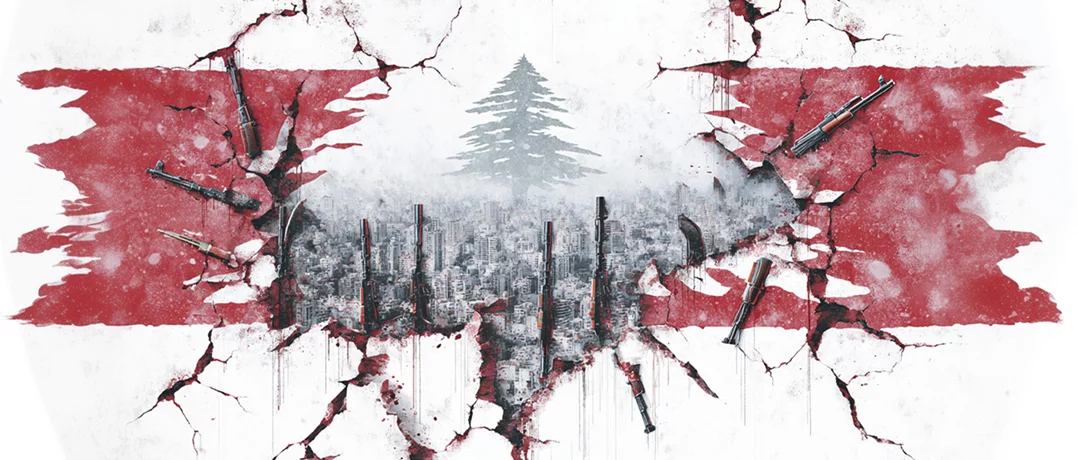From the spectacle at Raouché Rock to the daily paralysis of institutions, Hezbollah's arms undermine sovereignty, weaken the army and security forces, and threaten the country’s stability.
The drums of war echo once more in Lebanon
The drums of war echo once more in Lebanon


Hezbollah’s weapons are once again casting a dark, suffocating shadow over Lebanon’s political life. The spectacle of Hassan Nasrallah’s face plastered across Beirut’s Raouché Rock was no innocent stunt. It was a brazen civilian replay of May 7, 2008, when Hezbollah’s militias stormed the capital, crushed the state’s authority, and bullied Beirut’s residents into submission.
The message could not be clearer. By hijacking one of Lebanon’s most cherished landmarks, Hezbollah is reminding both Lebanese citizens and the international community that it still holds the state hostage. The party’s hand remains heavier than that of any government in Beirut, and it is not afraid to show it.
A shadow above the state
In that context, PM Nawaf Salam’s stance stands out. He reminded us of what it means for a statesman to bear the burden of the constitution and the rule of law, and to reject any violation of the state’s dignity.
But the more pressing question remains: why do those who are supposed to be the first bulwark of legitimacy, the ministers, the military, and security chiefs, fail to act? Their negligence and collusion are not minor lapses; they are a compounded offense.
Accountability must begin at home, within the very institutions of the state, among those who turn a blind eye to violations and enable the “statelet” to trample the authority of the state. Any debate over Hezbollah’s weapons is futile so long as the guardians of legitimacy cannot even defend that legitimacy themselves.
What is more alarming is that ministers, along with military and security leaders who collude with Hezbollah, become its partners, granting, in effect, a green light for Israel to strike and for war to return. For if the Lebanese Army cannot resolve a relatively minor incident such as what unfolded at Raouché, how can it possibly confront the far greater challenge of Hezbollah’s arsenal?
Meanwhile, Hezbollah’s leadership continues to insist on holding arms and pursuing the doctrine of “resistance,” insisting the state cannot protect Lebanon. Their rhetoric is laced with arrogance and contempt for state institutions.
That mocking posture toward the state and its capacities serves to mask their denial of the defeat they suffered. By flouting government decisions and demonstrating that their hand lies above the state’s, Hezbollah attempts to reclaim an aura dented by its confrontation with Israel, at the expense of the authority of legitimate institutions. But this defiance does not reflect the true state of its security or military posture. The recent war exposed vulnerabilities in its security apparatus vis-à-vis Israeli intelligence, which has retained the ability to carry out precise operations targeting its senior military figures and operatives.
Militarily, Israel succeeded in destroying much of Hezbollah’s arsenal and combat infrastructure, undermining its capacity to pose a tangible threat to Israeli security. Hezbollah that taunts the state now looks like a lame duck, incapable of mounting a credible response.
Weapons without purpose
As the debate over weapons intensifies, Hezbollah issues stark warnings, even threats of civil war, should political authorities move to implement the August 5 decision to place arms exclusively in state hands. Whether genuine or a bargaining chip, this threat reveals the role that the weapons have come to play.
Evaluating the function of this arsenal after the last war yields several clear conclusions:
1. The weapons once touted as a strategic deterrent no longer constitute a serious threat to Israel. The card that mattered most to Iran in the region has lost its potency and become a depreciated asset at the Iran–U.S. negotiating table.
2. The presence of arms outside state control provides Israel with a pretext to justify continued incursions and operations on Lebanon.
3. Armed groups outside the state’s authority are the principal obstacle to the flow of international aid for reconstruction.
4. Worst of all, the arsenal has become a tool for threatening the outbreak of civil war.
In short, these weapons are today ineffectual against Israel and harmful to Lebanon’s overall national interest, and particularly injurious to the Shiite community’s well-being. The state’s retreat in the face of Hezbollah is gravely alarming. What happened on the “Raouché” must not be dismissed: it signals, first, encouragement for Hezbollah to press its advantage; and second, a weakening of Lebanese confidence in the authority of legitimate institutions, and of the international community’s trust in the state’s ability to monopolize force. That very erosion is precisely what Israel could exploit to seize the military initiative.

